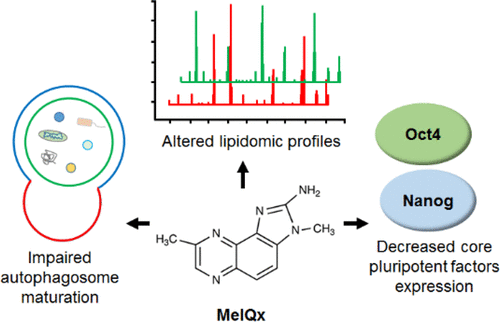当前位置:
X-MOL 学术
›
J. Agric. Food Chem.
›
论文详情
Our official English website, www.x-mol.net, welcomes your
feedback! (Note: you will need to create a separate account there.)
2-Amino-3,8-dimethylimidazo[4,5-f]quinoxaline Alters Autophagosome Maturation, Cellular Lipidomic Profiles, and Expression of Core Pluripotent Factors
Journal of Agricultural and Food Chemistry ( IF 5.7 ) Pub Date : 2019-04-01 00:00:00 , DOI: 10.1021/acs.jafc.9b01041 Dan Song 1 , Renpeng Guo 1 , Haibo Huang 1 , Peixiang Zheng 2 , Hong Huang 1 , Qinqin Oyang 1 , Xiaoyue Xiao 2 , Binran Wang 2 , Jingtong Rong 3 , Rong Liu 1, 4, 5
Journal of Agricultural and Food Chemistry ( IF 5.7 ) Pub Date : 2019-04-01 00:00:00 , DOI: 10.1021/acs.jafc.9b01041 Dan Song 1 , Renpeng Guo 1 , Haibo Huang 1 , Peixiang Zheng 2 , Hong Huang 1 , Qinqin Oyang 1 , Xiaoyue Xiao 2 , Binran Wang 2 , Jingtong Rong 3 , Rong Liu 1, 4, 5
Affiliation

|
2-Amino-3,8-dimethylimidazo[4,5-f]quinoxaline (MeIQx), one of the most abundant heterocyclic aromatic amines (HAAs) found in the human diet, is primarily produced during high-temperature meat or fish cooking. While MeIQx has been investigated as a potential carcinogen, the cytotoxicity and related molecular mechanisms remain unclear. Here, we demonstrate that autophagosome maturation is blocked by MeIQx. Mechanistically, MeIQx inhibits acidification of lysosomes rather than prevents autophagosome–lysosome fusion. Moreover, cellular lipid profiles are altered by MeIQx treatment. Notably, many phospholipids and sphingolipids are significantly upregulated after exposure to MeIQx. Furthermore, MeIQx decreases expression of pluripotency-associated proteins in mouse embryonic stem cells (ESCs). Together, MeIQx blocks autophagosome maturation through inhibiting acidification of lysosomes, alters lipid metabolism, and decreases expression of pluripotent factors. Our studies provide more cytotoxic evidence and elucidate related mechanisms on the risk of HAA exposure and are expected to promote supervision of food safety and human health.
中文翻译:

2-氨基-3,8-二甲基咪唑并[4,5- f ]喹喔啉改变自噬体成熟,细胞血脂谱和核心多能因子的表达。
2-氨基-3,8-二甲基咪唑[4,5- f]喹喔啉(MeIQx)是人类饮食中发现的最丰富的杂环芳香胺(HAA)之一,主要在高温肉或鱼烹饪过程中产生。尽管已经研究了MeIQx作为潜在的致癌物,但其细胞毒性和相关的分子机制仍不清楚。在这里,我们证明了MeIQx阻止了自噬体的成熟。从机理上讲,MeIQx抑制了溶酶体的酸化,而不是阻止了自噬体与溶酶体的融合。而且,通过MeIQx处理改变了细胞脂质分布。值得注意的是,在暴露于MeIQx后,许多磷脂和鞘脂都显着上调。此外,MeIQx降低了小鼠胚胎干细胞(ESC)中多能性相关蛋白的表达。一起,MeIQx通过抑制溶酶体的酸化来阻止自噬体成熟,改变脂质代谢,并降低多能因子的表达。我们的研究提供了更多的细胞毒性证据,并阐明了暴露于HAA的风险的相关机制,并有望促进对食品安全和人类健康的监管。
更新日期:2019-04-01
中文翻译:

2-氨基-3,8-二甲基咪唑并[4,5- f ]喹喔啉改变自噬体成熟,细胞血脂谱和核心多能因子的表达。
2-氨基-3,8-二甲基咪唑[4,5- f]喹喔啉(MeIQx)是人类饮食中发现的最丰富的杂环芳香胺(HAA)之一,主要在高温肉或鱼烹饪过程中产生。尽管已经研究了MeIQx作为潜在的致癌物,但其细胞毒性和相关的分子机制仍不清楚。在这里,我们证明了MeIQx阻止了自噬体的成熟。从机理上讲,MeIQx抑制了溶酶体的酸化,而不是阻止了自噬体与溶酶体的融合。而且,通过MeIQx处理改变了细胞脂质分布。值得注意的是,在暴露于MeIQx后,许多磷脂和鞘脂都显着上调。此外,MeIQx降低了小鼠胚胎干细胞(ESC)中多能性相关蛋白的表达。一起,MeIQx通过抑制溶酶体的酸化来阻止自噬体成熟,改变脂质代谢,并降低多能因子的表达。我们的研究提供了更多的细胞毒性证据,并阐明了暴露于HAA的风险的相关机制,并有望促进对食品安全和人类健康的监管。






























 京公网安备 11010802027423号
京公网安备 11010802027423号